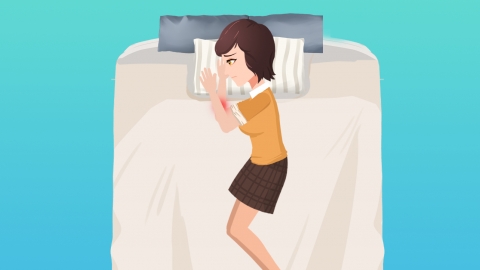Why does pressing on a tendon on the back of the hand cause numbness?
Generally, numbness in one tendon on the back of the hand when pressed may be caused by prolonged local compression, cold exposure to the hand, carpal tunnel syndrome, ulnar nerve injury, cervical spondylosis, or other reasons. It is recommended to seek medical attention promptly, identify the underlying cause, and receive symptomatic treatment under a doctor's guidance. Specific analysis is as follows:

1. Prolonged Local Compression: Maintaining a bent or compressed hand position for extended periods—such as sleeping on the back of the hand or supporting the head with the hand for long durations—can impair local blood circulation on the back of the hand, leading to numbness when a single tendon is pressed. Immediately change the compressive posture, move the hand, and perform actions such as clenching fists and stretching fingers to promote blood circulation; typically, the numbness resolves within a few minutes.
2. Cold Exposure to the Hand: When hands are exposed to low temperatures, cold stimulation can affect nerve conduction on the back of the hand, causing numbness upon pressing a single tendon. This is particularly common during winter or when directly exposed to air conditioning. Soak the hands in warm water at a temperature of 38–40°C for 10–15 minutes to alleviate symptoms.
3. Carpal Tunnel Syndrome: Excessive use of the wrist, such as frequent typing or mouse usage, increases pressure within the carpal tunnel, compressing the median nerve. This may radiate to the back of the hand, causing numbness when a single tendon is pressed, often accompanied by wrist pain. Patients may follow medical advice to take medications such as mecobalamin tablets, vitamin B1 tablets, or ibuprofen sustained-release capsules.
4. Ulnar Nerve Injury: Trauma to the hand or prolonged elbow compression can damage the ulnar nerve, resulting in numbness when the tendon on the ulnar side of the back of the hand is pressed, possibly accompanied by limited finger movement. Patients should follow medical advice to use medications such as mouse nerve growth factor injection, vitamin B6 tablets, or diclofenac sodium enteric-coated tablets to improve symptoms.
5. Cervical Spondylosis: Herniated cervical discs that compress nerve roots innervating the back of the hand can lead to numbness when a single tendon is pressed, along with neck aches and pains, and radiating arm pain. Patients may follow medical advice to take celecoxib capsules, etoricoxib tablets, Jingfukang granules, or other medications.
Daily care should include maintaining proper sitting posture and hand positioning, avoiding prolonged neck bending or excessive wrist use, and taking breaks to stretch the neck and hands during work. Keep hands warm and avoid trauma. Appropriate self-care can help reduce episodes of hand numbness and support overall hand and cervical spine health.




